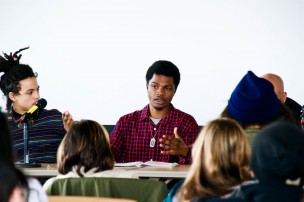The University hosted a discussion panel that tackled the issues of gang- and drug-related violence prominent in low-income areas across the United States on Saturday, Feb. 8. The panel was comprised of two members from Cure Violence, an anti-violence initiative, and three leaders from Circles & Ciphers, a leadership training program for young men entangled in the justice system. The event was planned with the help of two student groups: Invisible Men, a forum for University alumni and students who identify as men of color, and Ujamaa, which explores and educates the community about the African diaspora. Evan Okun ’13, now a program coordinator for Circles & Ciphers, moderated the event.
“The goal of the panel and performance was to expose Wes students to organizations that practice complex sociological theory,” Okun wrote in an email to The Argus. “Too many students across America study progressive theory in college, then graduate and take jobs at institutions that perpetuate oppression. The excuse I hear most often is: ‘I had to accept my job at…an investment bank, Teach For America, etc…. There were no other options.’ I want Wesleyan students to know there are other options.”
Ethan Viets-VanLear, a leader of Circles & Ciphers and a member of the panel, discussed the group’s purpose.
“Circles & Ciphers is a young men-of-color, hip-hop-based organization that uses restorative justice practices to facilitate conversation that dismantle legacies laced with violence, incarceration, drug abuse, patriarchal masculinity, as well as other topics,” Viets-VanLear said. “Hip hop is a major tool we use, incorporating songs and lyrics to the songs as [an] introduction to topics to be discussed. We meet once a week in a church located in the most north neighborhood of Chicago, Rogers Park.”
Cure Violence, formerly known as CeaseFire, Inc., is run by the Chicago Project for Violence Prevention. Cure Violence aims to prevent violence in the Chicago area. The group became better-known through the documentary “The Interrupters,” produced in 2011 by Kartemquin Films. Many of the organization’s employees have been incarcerated at some point in their lives or were involved in gang violence in their communities.
Prior to the panel, attendees viewed the “Interrupters” documentary, screened by Circles & Ciphers. The film helped facilitate discussion and provide some background for audience members who knew less about the issues about to be addressed.
“The thing about Chicago is that it’s actually like two different cities,” said Anna Cohen ’17, who attended the panel and resides in Chicago. “If you live on the north side and go to private school, or live on the south or west side and go to public, your experience is completely different. That’s why the violence doesn’t get the attention it deserves, because for those people who control most of the city, it’s not the city they have to experience everyday.”
The panel promoted discussion and awareness of the problems facing many urban communities today. It also gave students a platform to discuss possible solutions to these issues.
“In this day and age, there is almost no intentional space for people to meet in community, especially marginalized communities such as young men of color,” Viets-VanLear said.
The event ended with a poetry slam hosted by WeSlam in Alpha Delta Phi. Okun and members of Circles & Ciphers took part in the evening activity.
“Wesleyan was super dope,” Viets-VanLear said. “I stayed at Earth House and was astounded by everyone[’s] generosity and knowledge. Everyone I met was passionate about something, and doing something great with that passion. The ability to engage with anyone [on] a variety of topics, from pop culture, oppression, music, or social norms—everyone had input. Can’t wait to go back.”
Okun described Circles & Ciphers’ hopes to return to campus in the future.
“Circles & Ciphers prefers not to do panels, since panels reproduce the hierarchical [and] expert-driven model our organization seeks to dismantle,” Okun wrote. “Instead, we prefer to share our methodology by way of engaging people in the work we do. For this reason, there are plans to return to Wesleyan at the end of this semester to engage Wesleyan administrators, faculty, and students in restorative justice peace circles!”
Additional reporting by News Editor Tess Morgan.
